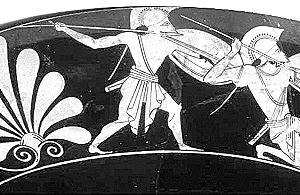
The tangled web of threads that brought them all to this place goes back eight years or more. The causes have as much to do with the pursuit of Theban hegemony over all the Hellenes (Greeks) and the bitter, sometimes fatal, politics of faction in the democratic city of Athenai as they do with any ambitions held by the dynamic king of the Makedones.
To understand the twists and turns from the Peace of Philokrates (346 BC) to this battle, one needs some background in Hellenic events. Roughly 150 years earlier, the Hellenes; under the leadership of the city- states of Sparte (Sparta) and Athenai defeated a series of Persian invasions. Some Hellenes had bowed to Persia, especially the north, from the Makedones through the Thessaliotes and down to the Boiotians.
The Athenians went on to build an empire throughout the islands and many coastal cities of the Aegean Sea. Sparte led the opposition to Athenai's attempt at hegemony. About 100 years before this day on the narrow river plain of the Kephissos, a war between Sparte and her allies and Athenai began that went on and on with few breaks for about 27 years. In the end, Athenian power was broken, her empire dismantled.
The liberties of the city-states promised by Sparte never occurred. Instead, Sparte interfered far and wide in the politics of other states. Athenal and a few states were able to break loose from the Spartan stranglehold (Korinthian War, 394-387 BC). To counter this movement, Sparte made peace with Persia, and with Persian gold and threat of intervention held down the Hellenes. The price of Persian support was their control of the Hellenic city-states of coastal Anatolia (Asia Minor).
The Spartans garrisoned Thebai. Through a ruse, a small band of Theban patriots gained entry into the fortress, the Kachneia. The Spartans were ousted. War ensued. Thebai quickly reasserted its leadership of the Boiotian League of cities (379/8 BC).
In 371, at Leuktra, the Boiotian army defeated the Spartans and their allies, killing one of Sparte's dual kings. The new tyrant of Thessalos (Thessaly), lason of Pherai, brought his huge army of mercenaries to support Thebai. So the war shifted in Thebai's favor.
Over the next several years, the Boiotians repeatedly carried the war into the Peloponnesos. They ringed Sparte and Lakonia with enemies by freeing the Messenes and helping to build the Arkadian confederation. Spartan power was irrevocably broken.
The brilliant Theban generals who made possible the Boiotian hegemony died in war. Pelopidas died fighting a successor of lason of Pherai in Thessalos. Pelopidas had led Theban interest in the north, and had even intervened during civil strife among the Makedones to force a compromise on their then king.
Epaminondas died at the battle of Mantinea in the Peloponnesos. He had led Theban interests in the south.
After Epaminondas' death (362 BC), Thebai had no generals of his and Pelopidas' abilities. At that battle of Mantinea, Thebai and her allies were ranged against Sparte and Athenai and their allies. Though Thebai prevailed, with the loss of Epaminondas, the cost was too great.
Rivalry in the North Between Philippos and Athenai
In the time since the liberation of Thebai from Sparte, Athenai had created a second confederation based on the islands and coastal cities. It was this second confederation that so threatened the Makedones during the reigns of Philippos' older brothers, Alexandros II and Perdikkas III.
Philippos succeeded to the rule of the Makedones when his brother Perdikkas died fighting the Illuric (Illyrian) Dardanians (359 BC). Philippos was first regent for his nephew, Amyntas IV, then ruler in his own right. In a meteoric series of diplomatic and military actions, Philippos defeated the immediate threats posed by the Dardanians, Paiaones, Thrakiotes, and Athenai. By 357, he was ready to assure the security of the realm by taking the offensive.
This was made possible because Athenai's attention was focused on war with several of her former allies who had dared withdraw from her confederation. Over the next two years, Athenai was fought to a standstill by the city of Byzantion on the Propontis (Sea of Marmara) and the islands of Rhodos, Khios, and Kos. The rebels were supported by a powerful ally in Mausolos of Halikarnassos, ruler of the Persian satrapy of Karia on the southwest coast of Anatolia.
During this interval, Philippos first took the independent city of Amphipolis and then began conquering the Hellenic cities on his kingdom's coast that were allied to Athenai - Pydna and Methone. These cities controlled the kingdoas trade.
The successful capture of Amphipolis caused Athenai to declare war on Philippos. Though an independent city, Amphipolis had been founded by Athenai to control the trade from the River Strymon valley and the gold production of Mount Pangaion. The city had revolted from Athenian control some generations earlier but was always coveted by Athenai, who launched numerous attacks on the city hoping to regain its control. Amphipolis was an emotional issue in Athenian politics all out of proportion to her value. To an Athenian, it was axiomatic that Philippos must be denied the city they coveted.
Hegemon: Philip of Macedonia
- Introduction and His Army
Hegemonic Rivalry
The Third Sacred War
The Peace of Philokrates Erodes
The Wars With Byzantion and Scythians
A Fourth Sacred War Declared
The Battle of Khaironea (Chaironea)
Making the Peace
Jumbo Map of Greece (extremely slow: 659K)
Jumbo Map of Philippos' Campaigns (extremely slow: 557K)
Jumbo Map of Battle of Khaironea (extremely slow: 462K)
Back to Table of Contents -- Against the Odds vol. 1 no. 1
Back to Against the Odds List of Issues
Back to MagWeb Magazine List
© Copyright 2002 by LPS.
This article appears in MagWeb.com (Magazine Web) on the Internet World Wide Web.
Other military history articles and gaming articles are available at http://www.magweb.com
* Buy this back issue or subscribe to Against the Odds direct from LPS.
